The Grenelle of the environment in Lebanon? The forests of Lebanon The April 28, RFI spent the second part of his environmental program "is not the Wind" in Lebanon. His guest of the day was none other than the famous Lebanese environmentalist Ibrahim Al Ali. At his side, many experts support it and enjoy the show to explain the problems that affect the environment in Lebanon, but also the solutions which accompany them.
 Dominique Desaunay
Dominique Desaunay : Welcome to all in this second part of "Is not the Wind" in the company of Ibrahim El Ali, president of Mawassem Khair means Harvests of Beneficence in French, which mission is to discover and preserve the biodiversity and richness of nature in Lebanon.
So it's a little souvenir from Lebanon that I visited in small markets. I can not believe they have a megaphone to harangue the crowd and sell their fruits and vegetables, and other favorites.
Ibrahim El Ali, the Pope once said, "Lebanon is more than a country, a message". And for you therefore, achieve a policy of environmental protection in Lebanon is at the same time convey that message to the entire planet?
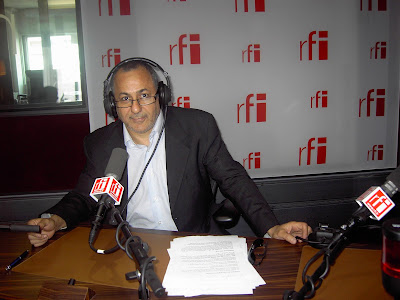 Ibrahim Ali El
Ibrahim Ali El : Exactly, exactly this. It is clear for example that the Arab television are very highly developed in the media space. And yet, everything is focused with respect to Lebanon. Lebanon is a real prism. Already in the history of Lebanon, it was through the Phoenicians, through the prism of the civilization of the Mediterranean, the construction of all ports. Lebanon has conveyed all these seeds that we found and it creates a Mediterranean plant in wildlife. And there's really a message. It's not just his or geopolitical geostrategic is also the richness of its water, plants, its coastline, its population.
Dominique Desaunay : Your Mawassem Khair NGO began its work by participating in defusing more than 4000 bombs in southern Lebanon and the fight against fires. But beyond these actions on the ground, you already thought to reforest the area?
Ibrahim Ali El : I think the reforestation of the region, especially in the reforestation of the forest. There is now increasing forest of pines that are taking place. The pine grows quickly, but it kills the primary forest. This is not rich in biodiversity.
My friend Alan, we work a lot on this project.
 Desaunay
Desaunay Dominique: So the idea is to federate all these little Lebanese NGOs dealing with environmental problems. So you are proposing a meeting with Ifat Edriss, president of the Lebanese NGO "Cedars for Care" that since 1998, moved to fight against the disappearance of the famous cedars of Lebanon. How did you meet Ifat Edriss?
Ibrahim El Ali It was through a friend I salute Houda Seoud. It mainly deals with shoreline cleanup, protection areas and marine animals like sea turtles She did a remarkable job.
Dominique Desaunay: And it is with us. Ifat, hello!
Ifat Edriss: Hello, hello Ibrahim. Ibrahim Ali El
: Ifat Hello!
Desaunay Dominique: So cedars of Lebanon to coastal clean, as you suggest anyone to explore marine biodiversity and to realize there are endangered species on the side of Lebanon.
Ifat Edriss: Absolutely, this is done here since 1997. It makes monitoring for dolphins, sea horses and we just know that there are seals that are already highly threatened and rare in the Mediterranean. There are 4 in Beirut.
Dominique Desaunay: You help hatchlings find their way to water, because if I understand it is a nesting site of the Lebanese coast.
Ifat Edriss: Absolutely, there is a range of 1, 6 km long on which turtles lay their eggs. When the shells explode, turtles do not know go to sea, because there are the lights of the municipality.
Dominique Desaunay: They are moving toward the light in fact.
Ifat Edriss: Here! They need help to find the path. Of course, if a rat or a dog who comes to eat, nothing is done. Let nature makes itself its own balance.
Dominique Desaunay: So I'd like to talk a bit about the 16th of May that will happen. Day cleaning the coast seabed. There you wait more than 25,000 people taking part in this special day which the citizen becomes aware that he must clean and decontaminate the coast. Is that correct?
Ifat Edriss: Absolutely, in 1997, we had just come out of the war. And everything was thrown into the waste water, there was no government. So we woke up in 1997 with a lot of waste around underwater and on the coasts. We are then 5 divers, we made the call. And 40,000 people responded. It was under water and on beaches. This year, we will take it because we always waste that are thrown to the sea, unfortunately. And I look forward to Ibrahim because he will come and help us!
Desaunay Dominique: Thank Edriss Ifat. Ibrahim El-Ali, to take the measure of coastal pollution, I suggest you revisit this report aired on France Television, the mountain of waste in Sidon in southern Lebanon exactly.
Report: It's called the dustbin of the Mediterranean. A mountain of 50 m high with waste plunge directly into the sea At the gates of Sidon in southern Lebanon. Mohammed el Saajri is a professional diver and he grew up the mountain.
Mohammed el Saajri : Formerly, it was a small discharge. There was not as plastics, cans, metal or trash. Today, she receives all kinds of waste, chemicals and industrial products. All landed here, this is a disaster for us and the Mediterranean.
Mohammed el Saajri invites us to dive.
Par 5 meters of water, our total surprise. As to measure our progress, we discovered a marine graveyard. Not the slightest trace of life. The Posidonia, these aquatic plants are essential to the reproduction of species have disappeared. Sunlight is always concealed by plastic bags floating in the water. At the entrance of the site, no control! No one really knows what the mountain holds, except perhaps those Palestinians who live scrap from the landfill.
Palestinian Scrapper: you can find everything here: plastic, boxes of clinical waste, as many syringes. We know it's dangerous, but he must live.
The days of heat released methane organic materials ignite. A cloud of smoke covered the city then.
Doctor: The air is contaminated, the sea is contaminated, groundwater is contaminated. Result, we are seeing more and more diseases, respiratory and allergy problems for some time, cancer.
Sidon mayor has proposed transferring the waste to other sites to be treated without success.
Mayor of Sidon: In Lebanon, everything takes a turn quickly and religious community. We can not move the garbage of Sidon, considered as Sunni, Shiite area in a (nearby). Similarly, you can not transfer waste Muslims in a Christian region.
The solution proposed by the Lebanese would be to extract the toxic wastes of the mountain, to flatten, stabilize it, then sell the Land to amortize the cost of the operation.
Dominique Desaunay: Ibrahim El Ali, you said at one point that Lebanon is not a dustbin. But frankly, still need to know if attitudes are ready to embrace the environmental cause in that country.
Ibrahim Al Ali: I think There was a big change after the visit of our Prime Minister Hariri at the Copenhagen summit. When I financed my own campaign in the reforestation "Lebanon is not a garbage can," my neighbors and my friends told me "but you're crazy to put your money, buy land for your children is better ". The Lebanese had a practice environment, but it was not an awareness of the environment. The fact is now coming to mobilize qu'Ifat May 16 from 25,000 to 40,000 citizens, I am not sure it happens here in France the same result. Lebanon, south of Naqoura in Tripoli in the north, we are all mobilized for this campaign. And that, I think there is a important impetus to the Prime Minister who made it happen.
Dominique Desaunay: There are also civil society.
Ibrahim El Ali is what I want to stress precisely. The problem of the environment through these different NGOs is that overcomes the political, religious and sectarian problems in Lebanon and it is something that belongs to all the Lebanese.
Dominique Desaunay: So this fight with your association, you lead with historical partners. Magda Abu Dagher is cofounder and vice president of the NGO "Jouzour Loubnan. Hello Magda!
Magda Abu Dagher: Hello!
 Dominique Desaunay:
Dominique Desaunay: So it's not only the sulfur cedar in Lebanon. There are also juniper, another tree that you wear your full attention because you are involved in reforestation, but the high mountains.
Magda Abu Dagher: You mention only the juniper but in fact there is a whole range of very interesting plants next to the cedar and juniper. So here I am the vice-president of Jouzour Loubnan and I am also Associate Professor at the University of St Joseph. Which means that I have a lot of students which by my side and ready to be mobilized to reforest Lebanon as part of Operation "7th Day" led by the University of St Joseph.
Dominique Desaunay: How do we concretely to replant in places like pretty steep, high mountains and when we want to reintroduce the concept of "primary forest". So it does not matter how reforestation?
Magda Abu Dagher: In fact, the mission of NGOs is precisely to act in arid mountain ... those regions that were once forested and covered with rich forest made of cedar, juniper but also full of pines and other secondary species. So here you have to have a bit of a pragmatist. First, we must begin by trial and error in order to restore this ecosystem. So see what was present at the base in that location, take into account climate change, soil type, rainfall, etc. ... and try to see the species likely to repopulate this place and give them the best chance to do so.
Dominique Desaunay: So, for communication, you also have a Facebook.
Magda Abu Dagher: Yes, indeed this is the Facebook of the association.
Dominique Desaunay: This allows you to build a network.
Magda Abu Dagher: Yes, before moving to the network, I would just note that for the association, the main problem was finding the Lebanese market and regional levels, the plants where we should use for reforestation in the mountains. In fact, the NGO established a laboratory germination and seed storage where you can go and gather in the wild in natural wood grains such as wild plum, wild shrubs spines located near the cedar and juniper, to grow and then entrust the germination protocol for local authorities with whom we will crash. This way there, we will facilitate some local and economic development. And at the same time, it is not based on the introduction of invasive species and foreign.
Dominique Desaunay: Ibrahim El Ali, so we spoke just now of the importance of reforestation and the same tradition. So there are nurseries of cedar?
Ibrahim El Ali Yes, Magda did a great job throughout his laboratory and his students. I participated in reforestation days with her, I can tell you it's a feast. One starts by bus from Beirut. We are going in the high mountains and really, it's a great joy. Look, we take children who are accompanied by their parents and who planted a cedar tree with Magda. When I came to participate in the day, I said to the child, "Look at this tree, give it a name." He identifies with that. A few weeks ago, I saw here in the Paris suburb of children who had guns and playing war. If you could get students in kindergartens, schools here to make out in class and replant, we change that.
 Desaunay Dominique: And it's a bit
Desaunay Dominique: And it's a bit your project here.
Ibrahim El Ali Absolutely! But I also want to remind that Magda was UNESCO Prize for the woman scientist, and she did a great job. I congratulate her. And I'd like that through Ifat, Magda, Mawassem Khair, it makes a confederation of environmental NGOs to propose bills to the government. As the Grenelle of the environment here in France, it would make sitting through the municipalities in Lebanon. It would be an idea in my opinion could change many things.
Dominique Desaunay: Magda So thank you, you agree to make appointment date that you fixed Ibrahim?
Magda Abu Dagher: I totally agree, it is our duty!
Dominique Desaunay: Okay. And here is the website address of the association: www.jouzourloubnan.org
Dominique Desaunay: This major Mediterranean project, you also lead by example with Alain Fried-lander, lecturer and professor at the University Provence in Marseille in environmental sciences. Just a word from Alain Fridlender, how do you work with him?
Ibrahim El Ali It was one week Visit to Lebanon to see different species, different seeds. Really, I want to say something that is extraordinary. It was in the mountains of cedars, high mountain at 2000 meters, and Alain screams with huge echo from the mountain! I told him, but what is Alain? He said he found a plant that was hyper-rare, a small plant yellow flower. It is this joy of sharing this work with him!
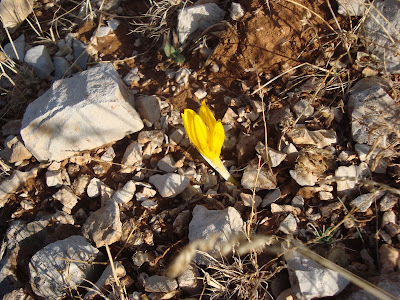
We are working to restore forests. For example, in Jezzine was a pine forest that is highly developed and very important. But the pine is a tree that kills biodiversity.
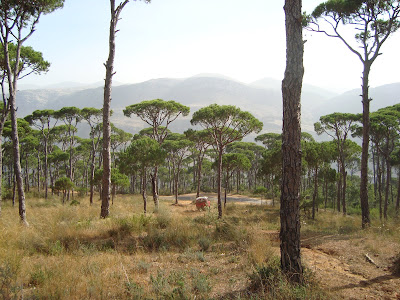 Dominique Desaunay:
Dominique Desaunay: In fact, if acid is well understood. It creates acid soils and biodiversity do not like acidity. It kills a lot of micro-organisms that would cons needed by other trees in the forest.
Ibrahim Al Ali: Exactly Dominique Desaunay: So Alain Fridlender, hello!
Alain Fridlender: Hello, hello to all listeners, I take the magic waves to greet Magda Ibrahim in Beirut and Paris.
 Dominica Desaunay:
Dominica Desaunay: So how is the plant on the edge of the Mediterranean?
Alain Fridlender : The plant is doing well if left alone. So I would like to address precisely this issue of forest, including the concepts of forest climate, not to be confused with the forest climate, neither primary nor with reforestation, and to insist on the question that torments a little every Eco Mediterranean not to confuse a field with a forest of trees, a cedar box with a cedar forest. A forest is a mixture of many species of plants, with lots of trees. Strawberry trees, junipers, cedars, pines, and remember especially the oaks with many species in Lebanon which are extremely endangered and which have often been threatened. And we could also talk about the forest Bkassine to Jezzine. And I think this is very interesting to emphasize that a forest, are not cubic meters of CO2, carbon, and they are not cubic meters of wood. Because very long time it was thought that the forest was exploited for timber or currently with the carbon tax, CO2 profitable. In fact, it is much more complex, a forest is a environment where live animals, plants, trees and many species.
Dominique Desaunay: Yes, we speak also of ecosystems in terms of forest. So, if the project was well understood, wants to revive it the primary forest is dying in Lebanon, to replace the current poor pine forest, which does not host in any case a rich biodiversity.
What are the real problems in terms of reforestation? What does it do exactly? First make a statement and then, what are the levers that you can tell us Alain Fridlender?
Alain Fridlender: I think there are two axes. The first axis, most importantly perhaps, is to educate people is to say, understand that a pine forest, this is not a forest but more often a field of trees. The case of forest Bkassine is instructive because in the end, many people try to protect this forest is actually a field of pine nuts. So it's an interest, but a field of pine nuts, it does not protect against soil erosion, it does not protect the population from the heat, it does not protect the herds of heatwaves and then all s' true. And under a pine forest, there more mushrooms, there is nothing left. While in the forest, we must be aware that pine trees planted, it is a field of trees that provides pine nuts, very useful in baking, but say that in terms of wealth and ecological value, but also of wealth for the farmer, this is nothing. In these forests, there are streams that are extremely rich, who harbor a remarkable flora. This flora helps maintain moisture, prevent flooding, and also, they are extremely resistant to fire corridors. So if we transform the pine forest is a monoculture of pine finally - is a field of trees like a cornfield in fact-if it is replaced by reforestation as said Magda with numerous species of junipers, oaks, rhododendrons, which promotes the natural vegetation of rivers, we will have a much more diverse forest in which we will be able to have the birds, food or many acorns for cattle to wild animals or even farm animals.
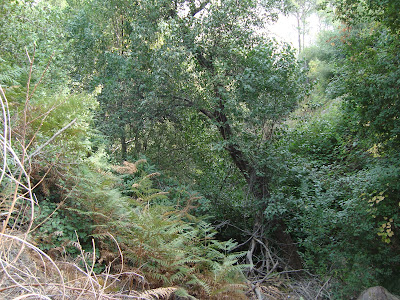
There will be more wealth in agriculture and also shading. Who said shading said reformation of a soil. And when the soil is reformed, it will be much less drying medium. And in a region such as Lebanon where indeed it is raining and there is a relative drought if you have a soil that has been reconstituted, if we have a diverse flora, well we will have a much better fire resistance. We will richest places in terms agriculture and also, we can have a better resistance to heat waves and all these issues there. So, without intervening in terms of fire management, flood management, the mere recovery of a diverse forest with its biodiversity will help prevent flooding and fire events. In fact, it does not take much and I think the first point is certainly act and replant the forest, but especially awareness of this diversity. I speak for example the case of this forest Bkassine where there is funding to protect it but lack of knowledge finally, we wanted to protect trees, pines, and fire. But this is not the most important. Most importantly, it will be to protect the streams there and promote the spirit of oaks that were growing naturally in the forest.
Dominique Desaunay : Yes Alan, it was understood, in fact everything is linked in a forest. Whether it be the river and what lives there. But I ask you, Alain and Ibrahim, how many generations must be to rebuild a forest?
Alain Fridlender: A forest is a long time. But we must begin. It's very long, but at the same time relatively fast. Because if you walk in the pine forest, you realize that in fact, of course, there are already oaks that grow spontaneously.

And finally, it is sufficient to promote these oaks. So obviously they will not push in 50 years they will be too small. But of course, they already regerment themselves. So, just to promote their growth, rather pines and disadvantage by promoting them. And gradually, they will. Obviously, this will be very long, do not dream.
Dominique Desaunay: Well yes, it will be very long, thank you Alain Fridlender!
Ibrahim El Ali, you have enough life to carry all your projects in Lebanon and elsewhere?
Ibrahim El Ali Yes, well, it's not enough of a life, just a tree. I am someone who plants trees. Just as I give this love to children and then, it will continue. But I would bounce on the wealth of the Lebanese people, the richness of Lebanese NGOs that have very little money. Look at the work of Ifat, Magda, we could all meet at some thirty NGOs and make proposals government, and I think it would significantly advance the environmental problems in Lebanon. Especially that Lebanon is a real message to humanity.
Dominique Desaunay : Thank you for your visit Ibrahim in "Is not the Wind"!



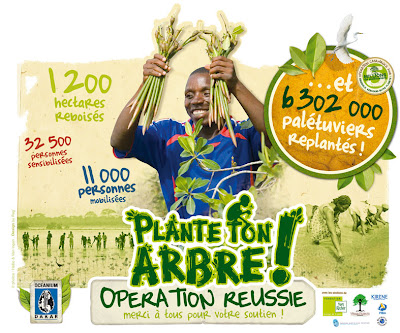 Throughout the Casamance, to Niafarang Elinkine of Nioumoune to Marssassoum through Tobor: men, women and children were replanted 6.302 million mangrove seedlings on an area of 1200 hectares. In 43 days of hard work, the villagers of Casamance have planted in the ground with the hope of mangrove propagules ...
Throughout the Casamance, to Niafarang Elinkine of Nioumoune to Marssassoum through Tobor: men, women and children were replanted 6.302 million mangrove seedlings on an area of 1200 hectares. In 43 days of hard work, the villagers of Casamance have planted in the ground with the hope of mangrove propagules ... 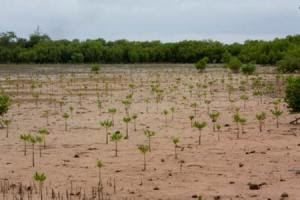
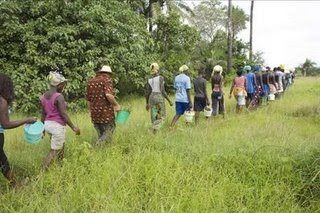
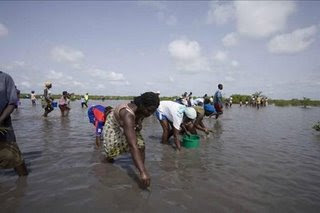
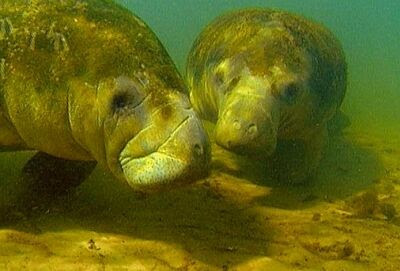
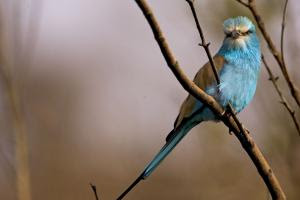
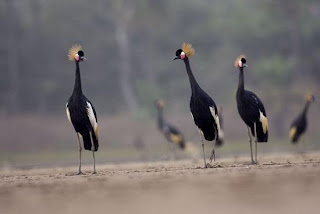

 ( women of Casamance are formed by women Saloum collection techniques responsible for mangrove oysters)
( women of Casamance are formed by women Saloum collection techniques responsible for mangrove oysters) 












